Google's latest: A spoon that steadies tremors
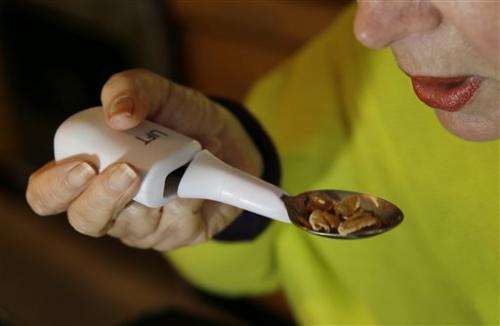
Google is throwing its money, brain power and technology at the humble spoon.
Of course these spoons (don't call them spoogles) are a bit more than your basic utensil: Using hundreds of algorithms, they allow people with essential tremors and Parkinson's Disease to eat without spilling.
The technology senses how a hand is shaking and makes instant adjustments to stay balanced. In clinical trials, the Liftware spoons reduced shaking of the spoon bowl by an average of 76 percent.
"We want to help people in their daily lives today and hopefully increase understanding of disease in the long run," said Google spokesperson Katelin Jabbari.
Other adaptive devices have been developed to help people with tremors—rocker knives, weighted utensils, pen grips. But until now, experts say, technology has not been used in this way.
"It's totally novel," said UC San Francisco Medical Center neurologist Dr. Jill Ostrem who specializes in movement disorders like Parkinson's disease and essential tremors.
She helped advise the inventors, and says the device has been a remarkable asset for some of her patients.

"I have some patients who couldn't eat independently, they had to be fed, and now they can eat on their own," she said. "It doesn't cure the disease, they still have tremor, but it's a very positive change."
Google got into the no-shake utensil business in September, acquiring a small, National of Institutes of Health-funded startup called Lift Labs for an undisclosed sum.
More than 10 million people worldwide, including Google co-founder Sergey Brin's mother, have essential tremors or Parkinson's disease. Brin has said he also has a mutation associated with higher rates of the Parkinson's and has donated more than $50 million to research for a cure, although Jabbari said the Lift Labs acquisition was not related.
Lift Lab founder Anupam Pathak said moving from a small, four-person startup in San Francisco to the vast Google campus in Mountain View has freed him up to be more creative as he explores how to apply the technology even more broadly.
His team works at the search giant's division called Google(x) Life Sciences, which is also developing a smart contact lens that measures glucose levels in tears for diabetics and is researching how nanoparticles in blood might help detect diseases.
Joining Google has been motivating, said Pathak, but his focus remains on people who are now able to eat independently with his device. "If you build something with your hands and it has that sort of an impact, it's the greatest feeling ever," he said. "As an engineer who likes to build things, that's the most validating thing that can happen."
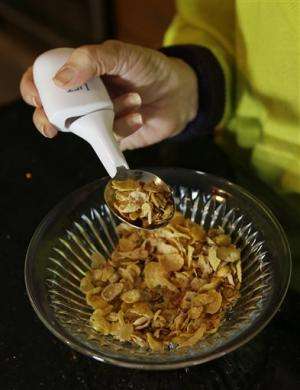
Pathak said they also hope to add sensors to the spoons to help medical researchers and providers better understand, measure and alleviate tremors.
Shirin Vala, 65,, has had an essential tremor for about a decade. She was at her monthly Essential Tremor group at a San Ramon medical clinic earlier this year when researchers developing the device introduced the idea and asked if anyone was interested in helping them.
As it was refined, she tried it out and gave them feedback. And when they hit the market at $295 apiece, she bought one.
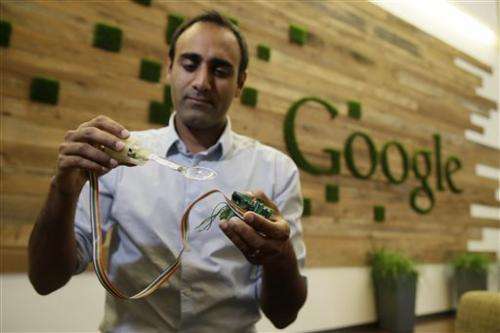
Without the spoon, Vala said eating was really a challenge because her hands trembled so hard food fell off the utensils before she could eat it.
"I was shaking and I had a hard time to keep the food on a spoon, especially soup or something like an olive or tomatoes or something. It is very embarrassing. It's very frustrating," she said.
The spoon definitely improved her situation. "I was surprised that I held the food in there so much better. It makes eating much easier, especially if I'm out at a restaurant," she said.
-
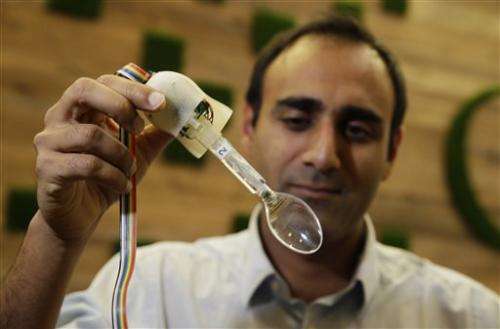
In this photo taken Friday, Nov. 21, 2014, Anupam Pathak, a senior hardware engineer at Google, shows off the prototype of the Liftware Spoon he developed that helps people eat without spilling in Mountain View, Calif. Just in time for the holidays, Google is throwing it's money, brain power and technology at the humble spoon. Not surprisingly, the company that has brought the driverless car and Internet glasses is bringing a unique improvement to the utensils. Built with hundreds of algorithms, these specially designed spoons make it much easier for people with tremors and Parkinson's Disease to eat without spilling. The spoons sense a shaking hand and make instant adjustments to stay balanced. (AP Photo/Eric Risberg) -
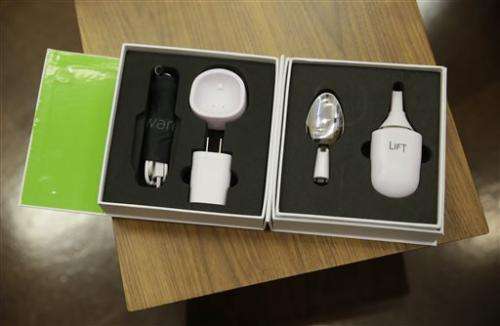
In this photo taken Friday, Nov. 21, 2014, is the Liftware Spoon, that helps people with eat without spilling, in its packaging at Google headquarters in Mountain View, Calif. Just in time for the holidays, Google is throwing it's money, brain power and technology at the humble spoon. Not surprisingly, the company that has brought the driverless car and Internet glasses is bringing a unique improvement to the utensils. Built with hundreds of algorithms, these specially designed spoons make it much easier for people with tremors and Parkinson's Disease to eat without spilling. The spoons sense a shaking hand and make instant adjustments to stay balanced. (AP Photo/Eric Risberg)
© 2014 The Associated Press. All rights reserved.


















